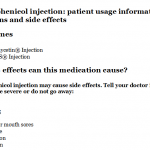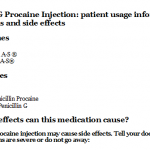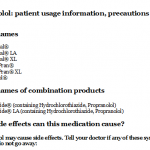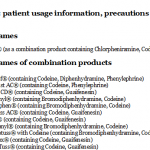
Amiloride: patient usage information, precautions and side effects
Tuesday, May 30, 2017 by Gregory Van Dyke
http://www.naturalnewsreference.com/2017-05-30-amiloride-patient-usage-information-precautions-and-side-effects.html
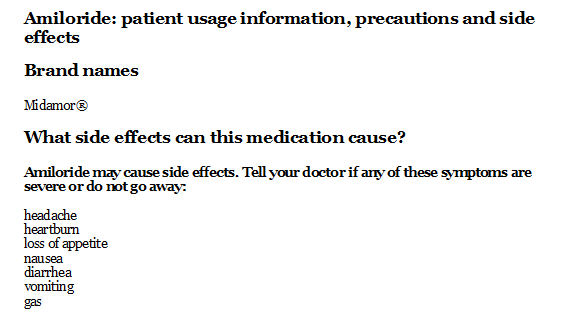
Amiloride: patient usage information, precautions and side effects
Brand names
Midamor®
What side effects can this medication cause?
Amiloride may cause side effects. Tell your doctor if any of these symptoms are severe or do not go away:
headache
heartburn
loss of appetite
nausea
diarrhea
vomiting
gas
Some side effects can be serious. If you experience any of these symptoms, call your doctor immediately:
dry mouth; thirst; numbness and tingling; confusion; muscle weakness, stomach pain, or cramps; fast heartbeat and other signs of dehydration and electrolyte imbalance
yellowing of the skin or eyes
chest pain
rash
itching
hives
difficulty breathing or swallowing
Amiloride may cause other side effects. Call your doctor if you have any unusual problems while taking this medication.
If you experience a serious side effect, you or your doctor may send a report to the Food and Drug Administration’s (FDA) MedWatch Adverse Event Reporting program online (http://www.fda.gov/Safety/MedWatch) or by phone (1-800-332-1088).
Why is this medication prescribed?
Amiloride is usually used in combination with other diuretics (‘water pills’) to treat high blood pressure and heart failure in patients who have low amounts of potassium in their bodies or for whom low potassium levels in the body could be dangerous. Amiloride is in a class of medications called diuretics. It works by causing the kidneys to get rid of unneeded water and salt from the body into the urine, but reduces the loss of potassium.
High blood pressure is a common condition, and when not treated it can cause damage to the brain, heart, blood vessels, kidneys, and other parts of the body. Damage to these organs may cause heart disease, a heart attack, heart failure, stroke, kidney failure, loss of vision, and other problems. In addition to taking medication, making lifestyle changes will also help to control your blood pressure. These changes include eating a diet that is low in fat and salt, maintaining a healthy weight, exercising at least 30 minutes most days, not smoking, and using alcohol in moderation.
How should this medicine be used?
Amiloride comes as a tablet to take by mouth. It usually is taken once a day with food. To help you remember to take amiloride, take it around the same time every day. Follow the directions on your prescription label carefully, and ask your doctor or pharmacist to explain any part you do not understand. Take amiloride exactly as directed. Do not take more or less of it or take it more often than prescribed by your doctor.
This medication controls high blood pressure and heart failure but does not cure these conditions. Continue to take amiloride even if you feel well. Do not stop taking amiloride without talking to your doctor.
Other uses for this medicine
This medication may be prescribed for other uses; ask your doctor or pharmacist for more information.
What special precautions should I follow?
Before taking amiloride,
-
tell your doctor and pharmacist if you are allergic to amiloride, any other medications, or any of the ingredients in amiloride. Ask your pharmacist for a list of the ingredients.
-
tell your doctor if you are taking spironolactone (Aldactone, in Aldactazide), other medications containing triamterene, or potassium supplements or potassium-containing medication supplements. Your doctor will probably tell you not to take amiloride if you are taking one or more of these medications.
-
tell your doctor and pharmacist what other prescription and nonprescription medications, vitamins, nutritional supplements, and herbal products you are taking or plan to take. Be sure to mention any of the following: angiotensin-converting enzyme (ACE) inhibitors such as benazepril (Lotensin, in Lotrel), captopril (Capoten), fosinopril, lisinopril (in Prinzide, in Zestoretic), moexipril (Univasc, in Uniretic), perindopril (Aceon), quinapril (Accupril, in Accuretic), ramipril (Altace), and trandolapril (Mavik, in Tarka); angiotensin II receptor antagonists (ARB) such as azilsartan (Edarbi, Edarbyclor), candesartan (Atacand, in Atacand HCT), eprosartan (Teveten, in Teveten HCT), irbesartan (Avapro, in Avalide), losartan (Cozaar, in Hyzaar), olmesartan (Benicar, in Azor, Benicar HCT), telmisartan (Micardis, in Micardis HCT), and valsartan (Diovan, in Diovan HCT, Exforge); cyclosporine (Gengraf, Neoral, Sandimmune); lithium (Lithobid); or nonsteroidal anti-inflammatory drugs (NSAIDs) such as ibuprofen (Advil, Motrin, others), indomethacin (Indocin), and naproxen (Aleve, Naprosyn, others); or tacrolimus (Astagraf XL, Prograf). Your doctor may need to change the doses of your medications or monitor you carefully for side effects.
-
tell your doctor if you have kidney disease. Your doctor may tell you not to take amiloride.
-
tell your doctor if you have or have ever had diabetes or liver disease.
-
tell your doctor if you are pregnant, plan to become pregnant, or are breast-feeding. If you become pregnant while taking amiloride, call your doctor immediately.
What special dietary instructions should I follow?
Avoid potassium-containing salt substitutes while you are taking this medication. Talk with your doctor about the amount of potassium-rich foods (e.g., bananas, prunes, raisins, and orange juice) that you may have in your diet.
What should I do if I forget a dose?
Take the missed dose as soon as you remember it. However, if it is almost time for the next dose, skip the missed dose and continue your regular dosing schedule. Do not take a double dose to make up for a missed one.
What should I know about storage and disposal of this medication?
Keep this medication in the container it came in, tightly closed, and out of reach of children. Store it at room temperature and away from excess heat and moisture (not in the bathroom). Do not freeze.
Unneeded medications should be disposed of in special ways to ensure that pets, children, and other people cannot consume them. However, you should not flush this medication down the toilet. Instead, the best way to dispose of your medication is through a medicine take-back program. Talk to your pharmacist or contact your local garbage/recycling department to learn about take-back programs in your community. See the FDA’s Safe Disposal of Medicines website (http://goo.gl/c4Rm4p) for more information if you do not have access to a take-back program.
In case of emergency/overdose
In case of overdose, call your local poison control center at 1-800-222-1222. If the victim has collapsed or is not breathing, call local emergency services at 911.
What other information should I know?
Keep all appointments with your doctor and the laboratory. Your blood pressure should be checked regularly to determine your response to amiloride. Your doctor may order certain lab tests to check your body’s response to amiloride.
Do not let anyone else take your medication. Ask your pharmacist any questions you have about refilling your prescription.
It is important for you to keep a written list of all of the prescription and nonprescription (over-the-counter) medicines you are taking, as well as any products such as vitamins, minerals, or other dietary supplements. You should bring this list with you each time you visit a doctor or if you are admitted to a hospital. It is also important information to carry with you in case of emergencies.
Why is this medication prescribed?
How should this medicine be used?
What special precautions should I follow?
What special dietary instructions should I follow?
What should I do if I forget a dose?
What side effects can this medication cause?
What should I know about storage and disposal of this medication?
Tagged Under: Tags: chemical medicine, medication, Pharma, Prescription Medicine

